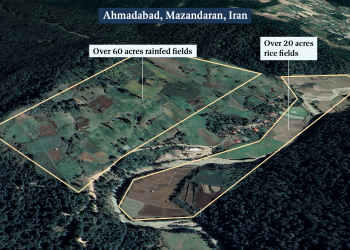Farmers displaced and farmlands seized as Iran’s government intensifies Baha’i religious persecution
Persian translation here
Farmlands, rice paddies and walnut orchards belonging to Baha’i families in the village of Ahmadabad, a lush and fertile agricultural community in Mazandaran province, were forcibly seized this week by Iranian officials who claimed the lands on behalf of the Iranian government.
No compensation or official documents justifying the seizures were provided by the agents who conducted the raid.
The raid is the latest incident in a rising pattern of persecution against the Baha’is across Iran—and the third recent example of religiously-motivated property seizures against Baha’i farmers in Mazandaran province.
Baha’is are Iran’s largest non-Muslim religious minority and are systematically persecuted—including through economic apartheid—under the Islamic Republic. These land seizures intend to forcibly displace the Baha’i owners and constitute an example of religious cleansing by the Iranian government. These actions run counter to the prohibition of discrimination in all international legal instruments—including those against farmers who play a crucial role in a country’s food security.
The agents arrived with industrial equipment and proceeded to fence off almost 100 hectares of land owned and cultivated by the Baha’i families. More than 80 Baha’i families own farms in Ahmadabad—half as residents, the other half living nearby—and Baha’i families have lived in Ahmadabad and farmed these lands for several generations.
Local residents reported that about 200 Iranian government forces, security service agents, forest rangers, special forces, and policemen, accompanied by people from national television and radio, tried to close the roads into the village and to prevent people from entering and exiting. The authorities then took most of their cell phones from the local population to prevent them from recording and documenting their actions and then entered the land and started fencing off the farmlands and rice paddies from the Baha’is.
Agents also took photos of the identity cards of any Baha’is who protested the seizures.
The raid marks the third time in recent years that Iranian authorities in Mazandaran have seized properties owned by Baha’i farmers, further to the 2021 leaking of confidential provincial documents testifying to the Iranian government’s intention to significantly increase their repression of the Baha’is. Homes were destroyed and lands were seized in the village of Roshankouh in 2022; in 2021, an Iranian court invalidated the property deeds of 27 Baha’is in the village of Ivel. And in 2022, in Semnan province, six properties owned by Baha’is were appropriated by an organization controlled by Supreme Leader Ayatollah Ali Khamenei.
The 200 agents involved in this week’s Ahmadabad raid were also many of the same individuals who conducted the 2022 land seizures and home demolitions in Roshankouh.
“Once again, the Iranian government shows its true colors by targeting innocent farmers who have tended their farms for generations, many of whom have never left their hometowns,” said Simin Fahandej, BIC Representative to the United Nations in Geneva. “These ordinary Iranian citizens not only produce food and crops for themselves but also for their community and the region. Like other Iranian citizens, they are just trying to subsist during these challenging economic conditions. The Iranian government’s discriminatory actions towards the Baha’is deprive not only these Baha’i families of their livelihoods but many others who rely on their agricultural production and who are themselves facing harsh economic and social conditions arising from the recent series of crises in Iran.”
The Baha’is in Ahmadabad believe this is an initial step, a prelude, to the demolition of their homes and future displacement.
Reports from the impacted community indicate that the agents who came to the village did not respond when the Baha’is asked for documents authorizing them to take these farmlands. Neither did the authorities provide prior notice of their action: they simply arrived at the village and built the fences. The use of force suggests that the action was taken because the locals are Baha’is.
“When will the Iranian government’s hatred and extremism end?” Ms. Fahandej said. “Many regions in Iran have suffered years of drought and the cost of living crisis has pushed basic foodstuffs beyond the reach of many ordinary families: yet the authorities have fenced off productive farms and pushed farmers off their land just because of their beliefs.”
“The Iranian government must remove these fences,” Ms. Fahandej added, “and restore access of the Baha’is to their farms. Anything less makes a mockery of their claims that Baha’is enjoy full citizenship rights in Iran. This is what is best not only for Baha’is but for everyone in the region during already challenging times.”
